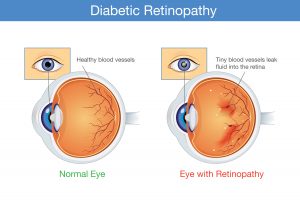What is diabetic retinopathy?
Diabetic retinopathy is an eye disease affecting people with diabetes. It is one of the leading cause of blindness. This condition damages the blood vessels at the back of the retina.These blood vessels are light sensitive. Those who have diabetes for over twenty years are more likely to have diabetic retinopathy.

What are the symptoms of diabetic retinopathy?
Diabetic retinopathy is a condition that usually affects both eyes. Initially, diabetic retinopathy may not have any visible signs, but with the passage of time, the following symptoms may be noticed:
- The patient may see clearly at one time and may not see clearly at other times.
- The patient can see blurred images.
- Dark areas are noticed within the visual field.
- Incorrect color vision.
- The patient may experience a gradual loss of vision.
What are the causes of Diabetic retinopathy?
The leading cause of diabetic retinopathy is unchecked blood sugar level. Excess sugar in the blood blocks the blood vessels that nourish the retina. This lack of blood supply compels the eye to produce new blood vessels. But these blood vessels tend to leak easily, as they are very fragile. This leakage can make the vision blurry and may also cause macular edema which eventually leads to diabetic retinopathy. It is noticed that it happens in patients who have diabetes for a long period.
What are the types of diabetic retinopathy?
Diabetic retinopathy has two types: Early diabetic retinopathy and Advanced diabetic retinopathy.
Early Diabetic retinopathy:
This condition is also called Non-proliferative diabetic retinopathy. This condition is caused by weakening walls of the blood vessels in the retina. A small outgrowth of lumps on the wall of the blood vessels is noticed which may leak blood and fluids. As this condition progresses, it blocks more and more blood vessels and leads to blurry vision. It can also cause dilation and irregularities in the blood vessels of the retina and may ultimately lead to blockage of the retina.
Related Article: What is a Macular Degeneration?
It can lead to swelling of the nerve fibers which in turn leads to macular edema (swelling of the macula).
In the beginning, early diabetic retinopathy does not show any symptoms.
Advanced Diabetic Retinopathy
This condition is also known as proliferative diabetic retinopathy. It is more severe as blood vessels are blocked due to damage, and it forces the eye to make new blood vessels. These new blood vessels are not very strong, and they tend to leak in the vitreous or the center of the eyes making the vision blurry. The growth of new blood vessels can also detach the retina from the back of the eye. The growth of new blood vessels can also restrict the flow of eye fluids. It builds up a pressure in the eye, resulting in glaucoma.

Who are at risk of developing diabetic retinopathy?
Diabetic retinopathy can affect anyone with diabetes, but the following conditions increase the risk:
- People who have diabetes for a long period.
- People with high blood pressure and high cholesterol levels.
- Pregnancy.
- Smoking and using tobacco.
What are the ways to preventing vision loss due to diabetic retinopathy?
Dr. Durocher, a Nashville Optometrist, is of the opinion that though we cannot avoid diabetic retinopathy entirely, but we can prevent vision damage. He believes that if the patient gets proper treatment on time and takes certain precautions, then he may prevent vision loss due to the condition. The following precautions can be taken:
- The most critical step to avoid vision loss due to diabetic retinopathy is to control diabetes. The patients with diabetes should watch their diet and concentrate on healthy eating and also do some physical exercises or activities.
- Keeping a check on blood sugar levels, blood pressure and cholesterol may also help.
- The usage of tobacco should be stopped to control diabetic retinopathy.
- If the patient notices any changes in the vision, like blurring of images, noticing floaters, etc. then he must see the doctor at the earliest to avoid further complications.
Diabetes can lead to many health complications including loss of eyesight, so it is essential that we monitor our blood sugar levels and maintain a healthy lifestyle. If you are suffering from Diabetic Retinopathy, consult an experienced optometrist right away!

